Life Lessons in Watercolor – Dealing with Uncertainty: Introduction
Life lessons in watercolor. Uncertainty. Perhaps you’re wondering what I’m talking about. Or maybe you see a few connections in your artistic journey.
I’m Darren from Watercolour Mentor. In this article, I will go through some of my thoughts about uncertainty, then we will talk about how it links to learning watercolor painting. I’ll also talk about some of my personal experiences feeling uncertain when learning or trying something new when painting.
Uncertainty is a normal part of life – we can never be 100% sure about what will happen next. Many people feel good about uncertainty and live lives where they seek excitement. Other people find uncertainty aversive, stressful, or distressing, and don’t function as well in uncertain situations.
Psychology Tools (https://www.psychologytoday.com/au/blog/the-right-mindset/202003/the-psychology-uncertainty)
Certainly, we can all relate. With the world changing rapidly, and the constant bombardment of not-so-good news, it’s difficult to feel like you can predict what’s going to happen next. It’s easy to feel paralyzed and to slip into old habits of thinking and doing.
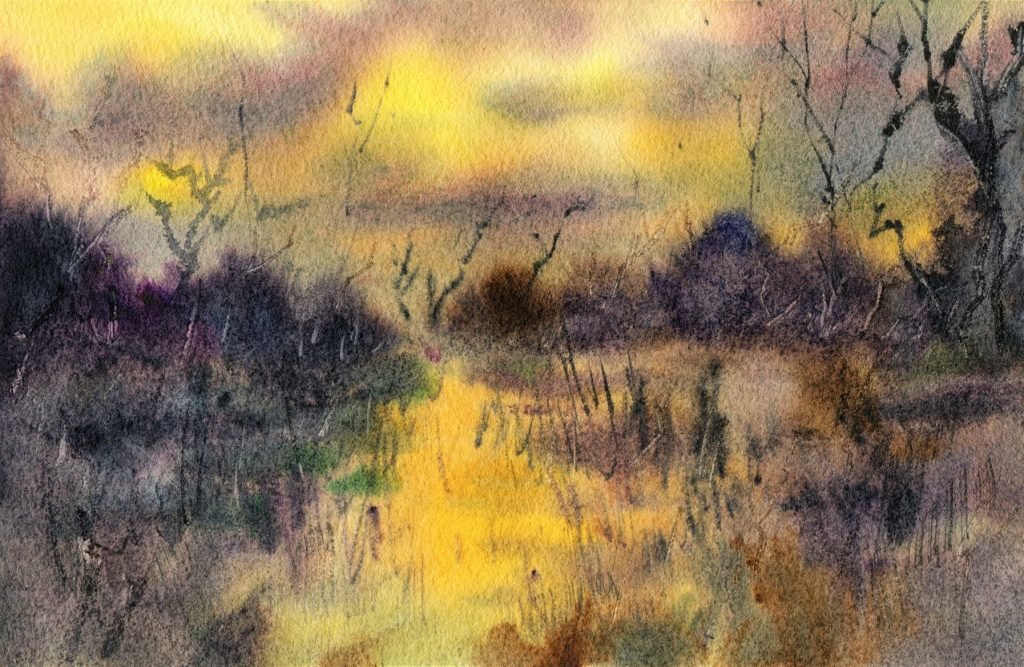
Why is watercolor painting so difficult to learn?
Looking back, watercolors intrigued me from the beginning. It was a completely different experience from painting acrylics or oils.
The unpredictable nature of watercolor is both exciting and frustrating. My paintings were always hit or miss. I didn’t know if my approach was right or wrong. Sometimes they looked great, sometimes not, and I struggled to replicate the same results again.
Watercolors are a constantly evolving medium. When you add color onto the paper, it immediately appears to be a certain tone, color, texture. Wait a moment later, and it can change slightly to quite dramatically. This depends on whether the paper is wet (and how wet),
Unlike other mediums such as oils or acrylics, when you make a mistake in watercolor, it is tricky or even impossible to correct it. You often have to accept and work with that ‘mistake’.
One of the most difficult things for me to learn was to ‘work’ with my mistakes. To carry on and turn it into a beautiful piece of artwork. There were many times where I felt like giving up during a painting, especially when comparing it to the reference photo. Now I find more than ever, my ‘mistakes’ end up teaching me something new about a technique, or creating a unique artifact in a painting that I like. I often make many mistakes during a painting, but only I seem to see them!
If I could talk to my younger self, I would just say that the path to great things is filled with a lot of stumbles, suffering, and challenges along the way. But if you have the right attitude and know that hard times will pass – and you get up each time – you will reach your destination.
Jonny Kim

Life lessons in watercolor: How can I handle uncertainty?
In the context of watercolor painting, I find that some of the following tips have helped me to deal with challenges. They will help you to deal with times where a painting doesn’t turn out as intended. Or perhaps when you want to try something new but overthink the entire process.
So let’s start:
- Be nice to yourself. When something goes wrong when you’re adding a colour, or shape or subject, it’s normal to feel frustrated. I felt this often in the beginning, especially when comparing the reference photo to my painting. When you’re new to painting, it seems like any brushstoke could end in disaster, or some unintended effect.
Some people deal with uncertainty better than others. Your tolerance for uncertain events may be higher or lower than others. Don’t beat yourself up for feeling annoyed. It’s normal to feel that way in the beginning. Remember that it takes time to move past a stressful situation, but as the emotions subside, it will surely pass. Be patient with yourself in the meanwhile.
Enjoy the process, and understand that everyone starts at the same place, and it takes time to make progress.
I was taught that the way of progress was neither swift nor easy.
Marie Curie
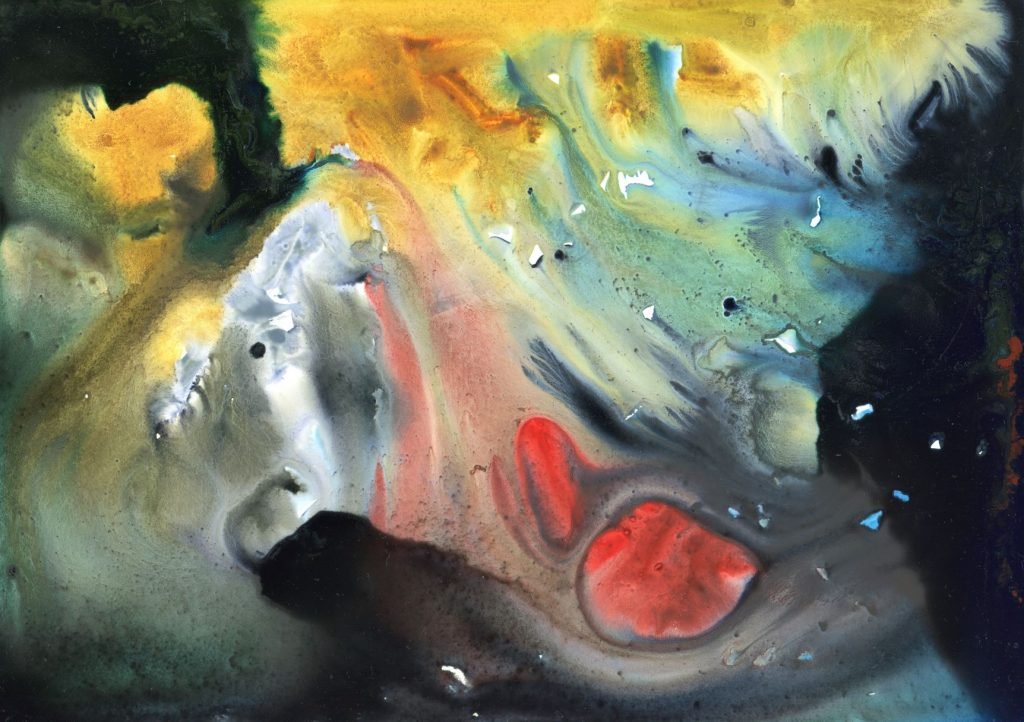
- Mentally Rephrase. Think of uncertainty as a way to step outside of your comfort zone. Do you remember the first time you did something that you eventually grew to enjoy? How did you feel?
Sometimes when we put ourselves in new situations, we can feel uncomfortable. Luckily, we can also choose to view and interpret this as an exciting opportunity to develop new skills. Competence leads to confidence! It’s about pushing through that initial tricky stage when we’re getting used to learning a new technique or subject.
Think of a particular style of subject that you have been avoiding painting. Ask yourself why you’ve been avoiding it. You may find you are worried due to not having tackled that subject before. Or you could be thinking of a bad experience in your past attempt.
The most experienced and talented people are often the ones who have made the most mistakes. Mistakes are an opportunity for growth. I have hundreds of paintings that didn’t work out!
A life spent making mistakes is not only more honorable, but more useful than a life spent doing nothing.
George Bernard Shaw

The practice sketches I did beforehand helped me to build my confidence to do this final scene live. I knew the general composition I wanted to portray, what colors I wanted to use, and how to draw the scene. Here is the full workshop if you’d like to learn how to draw and paint this.
- Reflect on previous wins. Think back to a time where you overcame an obstacle or difficult situation when learning a new watercolour technique. How did you handle the situation? Chances are, if you’re reading this, you survived and made it through.
Try to remember what you did that was helpful and see if you can apply the same thinking processes to the current situation.
There’s always something you find in a previous painting that you felt worked out well. I find that even in my paintings that didn’t work out, there’s bits and pieces that I liked, perhaps the background or a piece of detail. It can be tempting to dismiss the entire painting, but it’s just as easy to find something you like about it. Use it as a learning experience and say ‘I’ll do more of that next time’.
Also, remember to celebrate the fact that you completed the entire painting in the first place!
It’s not what you achieve, it’s what you overcome.
Carlton Fisk
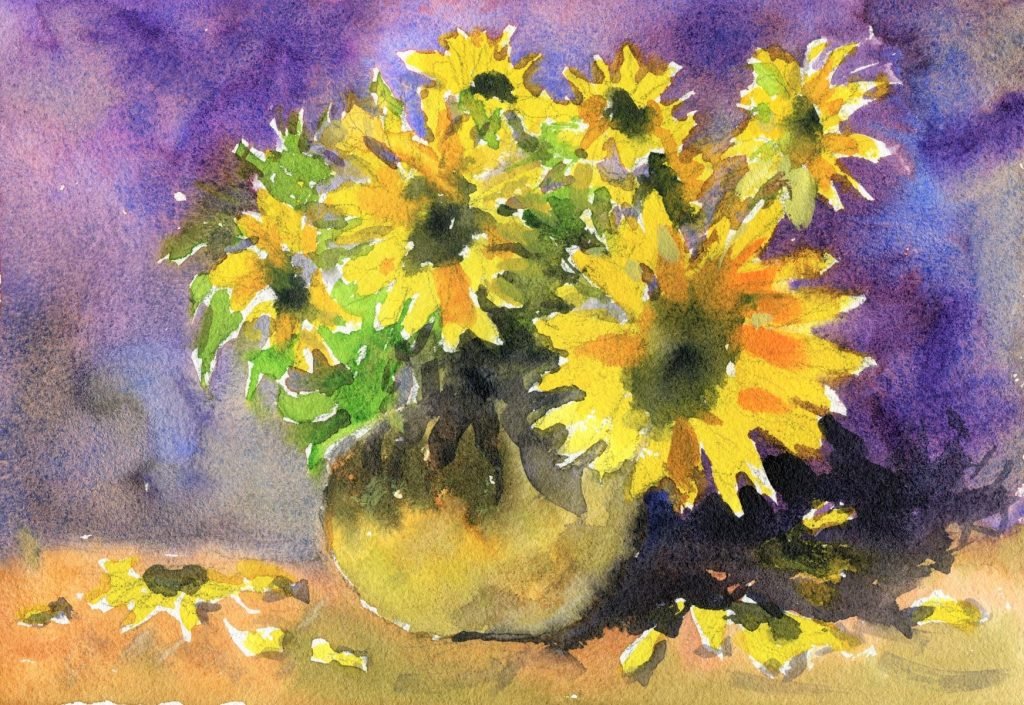
- Circle of control. Try not to dwell on things out of your control. When you add too much water onto your paper, and it creates a big mess. Or when you use the wrong color for the background.
When we feel uncertain, we can sometimes imagine worst-case scenarios. Break that cycle by being present in the situation. Accept the situation and think of how you can work with the mistake or downplay it.
Whatever you do, try not to ruminate on the situation! That can lead to you throwing in the towel. Focus on what you can control. You can control how often you paint, how often you try a new technique or subject. The outcome of the painting will be closer in your control once you pick up all the necessary skills and experience through practice.
You cannot control what happens to you, but you can control your attitude toward what happens to you, and in that, you will be mastering change rather than allowing it to master you.
Brian Tracy

- Take your own advice. If a friend came to you with the same worry about their painting, what would you tell your friend? Would you see things differently from an external perspective? This can often provide a more grounded, or even new perspective.
I’ve missed more than 9000 shots in my career. I’ve lost almost 300 games. 26 times, I’ve been trusted to take the game winning shot and missed. I’ve failed over and over and over again in my life. And that is why I succeed.
Michael Jordan

- Learn to accept uncertainty. No matter how much we try to control the environment around us, and our actions, the truth is, you need to accept that uncertainty will always exist in our minds.
Every time you need to make a decision on what photo reference to paint, which colors to use in the sky, whether to include or exclude certain elements in your composition.
Somestimes we have certain triggers that will lead us to feeling uncertain. It’s important to identify them look at the bigger picture. At the end of the day, it’s just paint and paper! If it doesn’t work out, there’s always a chance to try again.
In my personal artistic journey, I have found that uncertainty causes me to procastinate and overthink things. I wonder about what others would think. I would think twice on whether to post this or that. I’d delay a new project thinking I was not experienced enough. The options and outcomes would flood into my mind and I would feel paralysed.
It took me awhile to let go and to ‘let the audience decide’ on whether it was good or not. Either outcome helps me to learn more about myself and plan my next approach.
If you allow yourself to feel the uncertainty, you will find that like all emotions, eventually they will pass.
Human spirit is the ability to face the uncertainty of the future with curiosity and optimism. It is the belief that problems can be solved, differences resolved. It is a type of confidence. And it is fragile. It can be blackened by fear and superstition.
Bernard Beckett

Life Lessons in Watercolor: Conclusion
Learning to accept uncertainty will help you improve your painting skills, and it translates over to many other aspects of your life. I used to be uncomfortable being on camera, and even more uncomfortable trying to paint live for my viewers. I kept trying. Eventually, with more experience, that feeling passed. Now I’m surprised that some of my best paintings were created whilst I was on camera.
It pays off to find ways to challenge yourself. In order to get better at something, you must embrace that initial learning period where you are trying to grasp the basics. So try a new subject, a new technique, put your art out there, post in groups and forums to get feedback (we have one here and here).
Most importantly, understand maybe you’re not where you want to be right now, but you will be one day. Watercolors are one of the most difficult mediums to learn. Understanding that it will take a lot of practice and patience is the key to continuing on and becoming successful in your watercolor journey.
If you’re looking to learn more, I have comprehensive workshops that you can view through the playlists below.
Links and Extra Resources
Basic Materials (Affiliate Links):
Etchr Professional Black Drawing Pens – https://amzn.to/3d1zhil
Uniball Eye Drawing Pens: https://amzn.to/3letASU
Etchr Perfect Sketchbook – https://amzn.to/3n7ZQZm
Etchr Mixed Media Sketchbook – https://amzn.to/3DbFiEC
Daniel Smith Essential Mixing Set – https://amzn.to/3CaxD8e
Daniel Smith Secondary Watercolour Set: https://amzn.to/3nnr9yS
Daniel Smith Primary Watercolour Set: https://amzn.to/3Ct9cTV
Daniel Smith Mineral Mixing Set: https://amzn.to/3kP4YQi
Black Tulip Brush Set – https://bit.ly/2Scl7nM
Baohong 100% Cotton Watercolour Paper: https://amzn.to/30hNDs4
If you’d like to support me:
- https://www.buymeacoffee.com/darrenyeo
- https://paypal.me/watercolourmentor
- https://www.patreon.com/watercolourmentor
- https://watercolourmentor.com/courses/
Leave a comment below if you have questions & I’ll get back to you 🙂
Social Media:
- Facebook Page – https://www.facebook.com/watercolourmentor/
- Facebook Community – https://www.facebook.com/groups/watercolourmentor/
- Facebook Community – https://www.facebook.com/groups/watercolourbeginners/
- Instagram – https://www.instagram.com/watercolourmentor/
- Instagram – https://www.instagram.com/darrenyeoart/
My Courses:
- Official Course Website – https://watercolourmentor.com/courses/
- Skillshare – https://www.skillshare.com/r/user/watercolourmentor (Free 2 Week trial through this link)

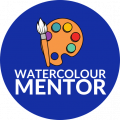
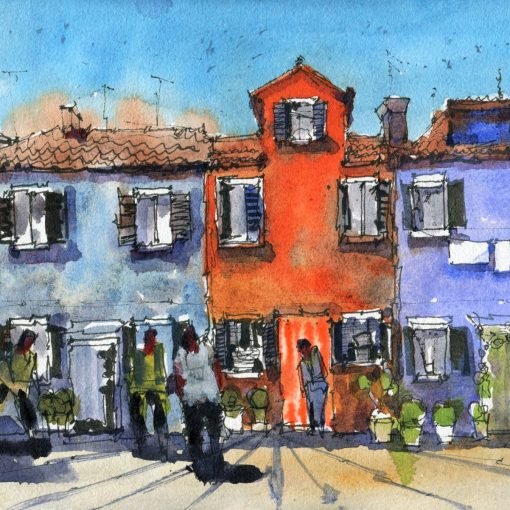
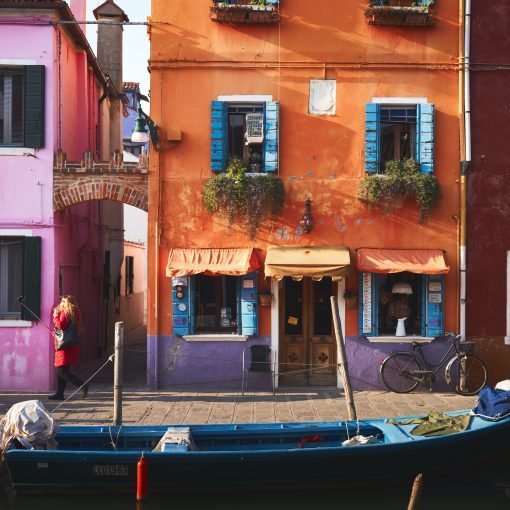


3 thoughts on “Life Lessons in Watercolor – Dealing With Uncertainty”
Thank you! This is so helpful.
This was a deep article Darren and very true! I can’t tell you how much more balanced I am after I have spent time in the rich wet colors and white paper to create something even if it does not come out the way I pictured it. Unlike my life, my art leaves with me with different consequences which are not at all harmful now that I have learned to accept my failures with my attempts to achieve something painted perfectly. Watercolors are loose and fluid and as you said, unpredictable, and it taught me to let myself loose too. There is much to be said for all that our artwork does for us on the inside. You cannot put a price on that kind of therapy.